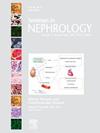求助PDF
{"title":"Utility of Genetic Information for Management in Kidney Transplantation and Living Donation.","authors":"Yasar Caliskan, Christie P Thomas","doi":"10.1016/j.semnephrol.2025.151658","DOIUrl":null,"url":null,"abstract":"<p><p>Kidney transplantation is the best treatment for kidney failure in eligible patients, significantly improving survival and quality of life. While short-term post-transplant survival has improved, long-term outcomes remain limited. Advances in genetic research have the potential to transform kidney transplantation. The shortage of donor organs underscores the need for improved organ availability, optimized immunosuppression, and enhanced monitoring to minimize repeat transplants. Improved understanding of monogenic kidney diseases and availability of genetic testing are increasingly informing the evaluation of transplant candidates and living donors. Expanding genetic testing to include pharmacogenomics and improved immunologic matching between transplant recipients and donors can improve post-transplant outcomes. Living kidney donors have perioperative risks and a 5-10 times higher likelihood of developing kidney failure, particularly if biologically related to the recipient. Some of this risk may be attributable to genetic factors that should be ascertained during donor evaluation. Polygenic risk scores offer promise for early risk identification, personalized interventions, and better long-term outcomes, though further validation is needed across diverse populations. Additionally, gene-editing technologies and personalized genomics may enhance donor-recipient compatibility, reduce graft rejection, and improve transplant success. These advancements in precision medicine are set to transform kidney transplantation by improving patient care and allograft longevity. Semin Nephrol 36:x-xx © 20XX Elsevier Inc. All rights reserved.</p>","PeriodicalId":21756,"journal":{"name":"Seminars in nephrology","volume":" ","pages":"151658"},"PeriodicalIF":3.5000,"publicationDate":"2025-07-01","publicationTypes":"Journal Article","fieldsOfStudy":null,"isOpenAccess":false,"openAccessPdf":"","citationCount":"0","resultStr":null,"platform":"Semanticscholar","paperid":null,"PeriodicalName":"Seminars in nephrology","FirstCategoryId":"3","ListUrlMain":"https://doi.org/10.1016/j.semnephrol.2025.151658","RegionNum":3,"RegionCategory":"医学","ArticlePicture":[],"TitleCN":null,"AbstractTextCN":null,"PMCID":null,"EPubDate":"2025/7/17 0:00:00","PubModel":"Epub","JCR":"Q2","JCRName":"UROLOGY & NEPHROLOGY","Score":null,"Total":0}
引用次数: 0
引用
批量引用
Abstract
Kidney transplantation is the best treatment for kidney failure in eligible patients, significantly improving survival and quality of life. While short-term post-transplant survival has improved, long-term outcomes remain limited. Advances in genetic research have the potential to transform kidney transplantation. The shortage of donor organs underscores the need for improved organ availability, optimized immunosuppression, and enhanced monitoring to minimize repeat transplants. Improved understanding of monogenic kidney diseases and availability of genetic testing are increasingly informing the evaluation of transplant candidates and living donors. Expanding genetic testing to include pharmacogenomics and improved immunologic matching between transplant recipients and donors can improve post-transplant outcomes. Living kidney donors have perioperative risks and a 5-10 times higher likelihood of developing kidney failure, particularly if biologically related to the recipient. Some of this risk may be attributable to genetic factors that should be ascertained during donor evaluation. Polygenic risk scores offer promise for early risk identification, personalized interventions, and better long-term outcomes, though further validation is needed across diverse populations. Additionally, gene-editing technologies and personalized genomics may enhance donor-recipient compatibility, reduce graft rejection, and improve transplant success. These advancements in precision medicine are set to transform kidney transplantation by improving patient care and allograft longevity. Semin Nephrol 36:x-xx © 20XX Elsevier Inc. All rights reserved.
遗传信息在肾移植和活体捐献管理中的应用。
肾移植是符合条件的肾衰竭患者的最佳治疗方法,可显著提高生存率和生活质量。虽然移植后短期生存率有所提高,但长期预后仍然有限。基因研究的进展有可能改变肾移植。供体器官的短缺强调了改善器官供应、优化免疫抑制和加强监测以尽量减少重复移植的必要性。对单基因肾病的认识的提高和基因检测的可用性越来越多地为移植候选人和活体供体的评估提供了信息。扩大基因检测,包括药物基因组学和改进移植受体和供体之间的免疫匹配,可以改善移植后的结果。活体肾供者有围手术期风险,发生肾衰竭的可能性高出5-10倍,特别是如果与受体有生物学上的关系。其中一些风险可归因于遗传因素,应在供体评估期间确定。多基因风险评分为早期风险识别、个性化干预和更好的长期结果提供了希望,尽管需要在不同人群中进一步验证。此外,基因编辑技术和个性化基因组学可以增强供体-受体相容性,减少移植排斥,提高移植成功率。精准医学的这些进步将通过改善患者护理和同种异体移植的寿命来改变肾移植。Semin Nephrol 36:x-xx©20XX Elsevier Inc.。版权所有。
本文章由计算机程序翻译,如有差异,请以英文原文为准。

 求助内容:
求助内容: 应助结果提醒方式:
应助结果提醒方式:


